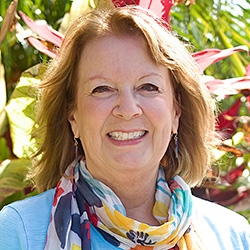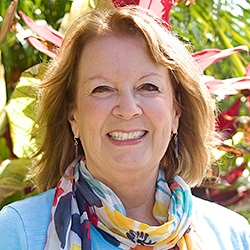
Search Results: men
-
Enjoy listening in as Arnina assists participants in fine tuning what they wish for their futures, and what practices they intend to embrace as the course winds down. She also offers strategies for what they can do if they forget their intended practice, and revisits the importance of untangling Needs from Core Belief.
-
Join Jim Manske for practice exercises that will help you navigate away from reactivity toward a more compassionate way of being in the world, and learn to express vulnerable honesty (scary honesty)
-
Jori and Jim Manske offer a process they call "The Zero Step," encompassing the characteristics of warmth toward self and other, care for the vitality of both yourself and other(s), wonder/interest, vulnerability and empathy, which leads directly to connection requests and an openness to outcome.
-
Inspired by a talk given by Marshall Rosenberg, Jim offers an interactive exploration of powerful strategies for making NVC an integral part of your everyday life.
-
Join CNVC Certified Trainers Jim and Jori Manske for this session that will help you minimize your reactivity and live in greater choice.
-
Eric offers some tips for nurturing and affirming ourselves as a daily practice.
-
Eric offers us a list of some of his favorite books, articles, and videos related to building successful relationships.
-
Rachelle Lamb invites us to consider how our well being is impacted by what we choose to put at the center of our narrative regarding our needs. And how that affects whether or not we get closer to truly serving life and compassion...
-
Getting "feel good" empathy can become an addiction. Even to the point of seeing people who don't offer empathy as "not being NVC". Rachelle urges us to notice how this view of NVC can be seductive, and even dangerous. In this article, she explains how we can expand our compassionate awareness when we go beyond equating NVC with harmony and empathy. She asks us to become more open to noticing others' experiences even if it challenges our personal and collective belief systems -- and especially when it upsets us to consider it.
-
Trainer Tip: What are your goals, hopes and dreams? For greater success it’s important to make your goals concrete, specific, and focused on what do you want (rather than what you don't want).
-
Little negative impacts can become big when left unattended. Watch for things like using a sharp tone, choosing not to share something, going along with something when you don’t really want to, trying to convince your partner, impulsively turning away, shrinking, losing access to parts of yourself, hiding, daydreaming about a different life, and judgmental thoughts. Instead, shift the dynamic: take responsibility, provide empathy, and commit to change.
-
The pandemic asks us to examine the way we have always done things. It asks to try something new and notice what happens. This is an opportunity to ask why you have done holidays in a certain way and what needs it met to do it that way. Perhaps it is an opportunity to experiment and see what new things might arise. Read on for questions to ask yourself that might help you process your triggers, "should's", feelings, needs and dilemmas.
-
Sitting with uncertainty can be very uncomfortable and evoke anxiety. Or it can be a practice that brings in the curiosity and inner spaciousness that allows for creative solutions to emerge, and that help us to relax our attachment to outcomes. Here's a closer look...
-
Here's a quick tip to improve your empathy skills with empathy guessing.
-
Borrowing teaching exercises from others can be fun and easy. However, when you develop your own, it deepens your learning and enables you develop your own teaching style.
-
Whenever we make mistakes, we're often beating ourself up in a way that breeds guilt, fear and/or shame. Nonviolent Communication offers a model based in self-empathy that lets you reflect, process and move forward without the guilt, fear and shame.
-
When we're on the receiving end of pain-stimulating assumptions, a microaggression, or prejudice --when we're reactive and resultingly have self-doubt, guilt or shame in ourselves-- is it possible to be intensely authentic while holding care for everyone in the situation? Can we effectively do this even as a third party witnesses to these things? Self-empathy, empathy, and a commitment to authenticity have become essential tools I need to keep sharpened in my toolbox if I am to show up and do the work I value in this world.
-
Miki Kashtan hosted Living Room Radio Show on KPFA Radio 94.1FM in Berkeley, California, USA. Listen as she works with a caller who outlines a conflict between two people who are crucial to the cohesiveness of a dance troupe and asks, “What do you do when you see a conflict between two people in a group, when you are not directly involved?” Miki starts by acknowledging the challenge of mediating a conflict when you have not been asked to do so. In such a situation, she recommends that people speak from their own experience and then outlines how one could do this.
-
Interested in bringing NVC consciousness to your workplace, but want to use a natural and conversational way of speaking? Listen in as Jeff describes three specific skills you can apply immediately: #1: How to express your understanding of a co-worker’s needs; #2: How to apply the three dimensions of needs in a business setting; and #3: How to make a Symbiotic Request that acknowledges holding multiple needs.
-
In this Life Hack, we're going deeper into self-empathy with a simple guided reflection that you can work through. This will be followed by a short exercise with a fill-in sheet led by Gesine and is something you can come back to as you wish.


















